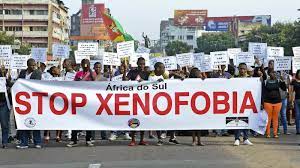An Empirical-Causative Analysis of the Politics of Xenophobia in South Africa
Main Article Content
Abstract
Several scholarly and scientific attentions have indeed been geared towards the studies on xenophobia in South Africa, but little and very limited interrogation have been devoted to its precipitating politics. Extant works and studies on xenophobia in South Africa, in addition to their differing perspectives, have focused more on how to address the xenophobic reality rather than trying to understand why the politics of xenophobia has persisted unabatedly despite several remedial interventions from government and key stakeholders. This study bridges the gap by attempting to, very importantly, understand and advance reasons as to why the politics has continued against all efforts geared towards addressing it. While Brown Harry’s scapegoating thesis, Pillay’s relative deprivation of South African blacks and Crush’s cultural explanation amongst many others have attempted to offer empirical views on the manifestation of xenophobia in South Africa, that which is central to the understanding of the xenophobic phenomenon was innocently overlooked. The study therefore sees “politics” has been central to any attempt to understanding the manifestation of xenophobia in South Africa. The overwhelming scientific discourses and perspectives offered by this study on the politics of xenophobia would therefore help in bridging the gap in the extant literature and the body of knowledge.
Article Details

This work is licensed under a Creative Commons Attribution-ShareAlike 4.0 International License.
All writings published in this journal are personal views of the authors and do not represent the views of this journal and the author's affiliated institutions. Author(s) are retain the copyrights of the Article. However, before publishing, it is required to obtain written confirmation from Author(s) in order to ensure the originality (Author Statement of Originality). The statement is to be signed by at least one of the authors who have obtained the assent of the co-author(s) where applicable.This work licensed under a Creative Commons Attribution-ShareAlike 4.0 International (CC BY-SA 4.0)
References
BBC News (2019). South Africa: How common are xenophobic attacks? Available at: https://www.bbc.com/news/world-africa-47800718.
Consortium of Refugees and Migrants in South Africa (CORMSA). (2007). Protecting refugees and Asylum seekers in South Africa. Available at: http://www.cormsa.org.za/wp-content/uploads/2008/06/cormsa07report.pdf
Crush, J. (2001). The dark side of democracy: Migration, Xenophobia and Human Rights in South Africa. International Migration, 38(6), 103-133.
Crush, J. (2008b). The perfect storm: The realities of xenophobia in contemporary South Africa. Cape Town/Kingston: Southern African Migration Project.
Crush, J. and Pendleton, W. (2004). Rationalizing Xenophobia? Citizens Attitudes to Immigration and Refugee Policy in Southern Africa. Southern African Migration Project.
Danso, R. and McDonald, D.A. (2000). Writing Xenophobia: Immigration and the Press in Post Apartheid South Africa Migration Policy Series No. 17, Cape Town: IDASA.
Draman, R. (2003). Poverty and Conflict in Africa: Explaining a Complex Relationship’. A Paper prepared for Experts Group Meeting on Africa-Canada Parliamentary Strengthening Program, Addis Ababa. May 19-23, 2003.
Harris, B. (2002). Xenophobia: A New Pathology for a new South Africa?’ in Hook, D. & Eagle, G. (eds). Psychopathology and Social Prejudice, Cape Town: UCT Press.
Harvey, E. (2008). ‘Worse to Come if Conditions Don’t Improve: Scramble for Jobs, Housing Ignites Violence. SA Media, 22 May, Cape Times, p 9.
Hendricks, C. and Whiteman, K. (Rapporteurs) (2004). ‘South Africa in Africa: The Post-Apartheid Decade, Seminar held in Stellenbosch 29 July-1 August 2004, Seminar Report, November 2004, Cape Town: Centre for Conflict Resolution.
HSRC (Human Sciences Research Council) (2008). Citizenship, Violence and Xenophobia in South Africa: Perceptions from South African Communities,’ Democracy and Governance Programme, June 2008, Human Sciences Research Council.
Human Sciences Research Council (2008). Violence and Xenophobia in South Africa: Developing consensus, moving to action. Available at: File:///C:/Users/HP%20PC/Downloads/5504_Hadland_ViolenceandxenophobiainSA%20(3).pdf.
Landau, L.B., Ramjathan-Keogh, K. &Singh, G. (2005). Xenophobia in South Africa and problems related to it. Forced Migration Working Paper Series #13. Johannesburg: University of the Witwatersrand.
Minnar, A. (2005) ‘Victimization and Rights of Foreign Migrants in South Africa,’ Davis, L. and Snyman, R. (eds). Victimology in South Africa, Pretoria: Van Schaik Publishers.
Nell, I. (2009). The Tears of Xenophobia: Preaching and Violence from a South African Perspective. Practical Theology in South Africa, 24(2), 229-247.
Nyamnjoh, F.B. (2006). Insiders and Outsiders: Citizenship and Xenophobia in Contemporary Southern Africa, Dakar: CODESRIA Books.
Obademi, O.E. & Uadiale, O. M. (2004). ‘Xenophobic Killings in South Africa and Economic Globalization: Emerging Issues,’ & Nyamnjoh, F.B. (eds.) Xenophobia: A Contemporary Issue in Psychology, London, Zed Books.
Pillay, D. (2008). Relative deprivation, social instability and cultures of entitlement. In S. Hassim, T. Kupe and E. Worby (Eds.). Go home or die here: Violence, xenophobia and the reinvention of difference in South Africa (93-104). Johannesburg: Wits Press.
Policy, 110 (spring): 82-96.
South African Broadcasting Corporation (2015). Xenophobic Attacks Impact Negatively on Business. April 20, 2015.
Statistics South Africa. (2020). SA Economy Sheds 2.2 million jobs in Q2 but unemployment levels drop. Retrieved March 10, 2021, http://www.statssa.gov.za/?p=13633.
Trading-Economics (2019). South Africa Unemployment Rate. Retrieved from https//: www.tradingeconomics.com at 23/10/19.
Ukwandu, D. C. (2017). Reflections on xenophobic violence in South Africa: What happens to a dream deferred? African Journal of Public Affairs, 9(9), 43-61.
Webb, B. (2008). ‘Departments Slated for Spending,’ SA Media, 12 June, Star, p 6.
Zondi, S. (2008). Xenophobia Attacks: Towards Understanding of Violence against African Immigrants in South Africa. African Insight, 38(2), Africa Institute of South Africa.
